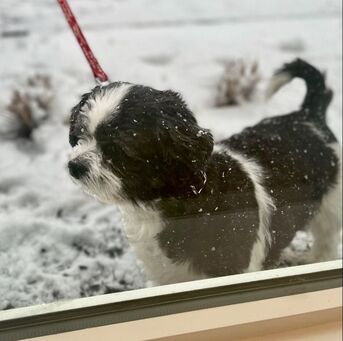 The air’s turning cold, the days are growing shorter, and winter is just weeks away. As much as we all love sledding, snowball fights, and warm mugs of hot chocolate, winter also brings with it some unique petcare challenges that aren’t present during the warmer months. Keep your winter more delightful than frightful by following these quick tips for winter weather safety! Frosty Fleas (and Ticks, and Heartworm): If there’s one upside to winter temperatures it’s that all those nasty warm-weather parasites have died off, right? Wrong! Ticks can be active in temperatures as low as 40 degrees, while fleas can get all the way down to 33 degrees. And while New England winters are colder than this on average, it’s not uncommon to end up with a few unseasonably warm days in the middle of the coldest months. If you’re thinking “Wow, what beautiful weather!”, then unfortunately so are those pesky parasites. That’s why we strongly recommend continuing flea, tick, and heartworm prevention year-round, no matter how cold it is. Wipe those paws: The same salts that prevent us from slipping on icy sidewalks and injuring (or embarrassing) ourselves can be rough on a dog’s paws. Wiping your dog’s paws down after a walk can prevent irritation to their paw pads, and will also keep them from licking off residue that can be harmful or toxic. Depending on how sensitive your dog’s paws tend to be, you can also consider using booties or paw balm to help protect them during your winter outings.
 Mind your mercury: You know, like they used to put in thermometers? Just like humans, dogs and cats can be sensitive to the cold, and can suffer from frostbite or hypothermia. Limit their outdoor time once temperatures hit freezing, and consider putting a sweater on puppies or dogs with short coats. Don’t leave them alone in your car either; a freezing car can be just as dangerous as a hot one! Get ready to get snowed in: There’s a big difference between “Snow day” and “Snow week.” Hope for the best but plan for the worst by making an emergency kit ahead of time, so you’ll be prepared in the case of an extended power outage or a prolonged snow-in. We recommend keeping at least three days of your pets’ food, water, and medication, as well as some special toys and treats to help keep them relaxed while they’re cooped up. And be sure to check out mass.gov’s Winter Storm Safety Tips for general advice about keeping your home and human family members safe as well!  Check your car: The inside of your car’s hood might not sound like a cozy resting place to you, but to your cat a warm, enclosed space like that is prime napping real-estate. Before starting your car make sure any cats in your house are accounted for, and check your hood or make some noise to flush out any feline stowaways. Chip ice and chip pets: If you’ve sniffed one snowflake, you’ve sniffed them all. A thick blanket of freshly-fallen snow looks beautiful to us, but it can also cover up familiar scents and make it harder for a wandering pet to find their way back home. Prevent your dogs from getting lost by keeping them on a leash during winter walks, and increase your odds of reuniting with a lost dog or cat by microchipping them and giving them a well-fitting collar with up to date contact information. For some additional winter petcare advice, check out our previous blog on the same topic. Now bundle up, light a fire, and let’s make this winter a great one! Comments are closed.
|
|
OFFICE HOURS:
Monday-Friday: 8:00 am to 6:00 pm Saturday: 8:00 am to 12:00 pm |
CONTACT INFORMATION:
Concord Animal Hospital 245 Baker Avenue Concord, MA 01742 Phone: (978) 369-3503 Fax: (978) 371-9748 [email protected] |
JOIN OUR PACK!
Sign up for our monthly newsletter, the Paw Press for hospital news, pet care tips and cute pet photos! |
Copyright © 2022

